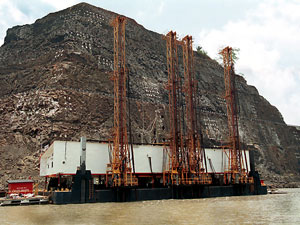The United States and Panama signed a free trade agreement on Monday that, if approved by the legislative bodies of both countries, will greatly affect the ability of U.S. firms to participate in the planned $5.25-billion expansion to the Panama Canal.
 ACP Expansion will be a boon for dredge equipment suppliers. |
The two countries initiated free trade talks two years ago but the agreement was delayed until after a referendum in Panama last November that gave the green-light the canal expansion.
The U.S. is Panama's largest trading partner and trade between the two reached $2.5 billion in 2005, a 22 percent jump over the year prior.
"The agreement will ensure that U.S. firms will have an opportunity to participate, on a competitive basis, to provide goods and services, including construction for the Panama Canal, during this major modernization project," said the US Trade Office in a statement released Monday.
The Panama Canal Authority (or ACP), the autonomous government agency that maintains the waterway, is moving forward with the expansion to the waterway that was approved by voters in that country last October.
The expansion project consists of building a third lane of traffic as well as the construction of a new set of locks. When complete in 2014, the project will effectively double the capacity of the 50-mile-long waterway and permit the passage of post-Panamax ships too large for the existing canal.
The ACP plans to pay for the work through a system of graduated toll increases that must be approved by the Panamanian legislature. The expansion is expected to raise the annual income from tolls to more than $6 billion.
"We have to assemble the team and have them in place before we can begin moving forward with the work itself," said Jorge de la Guardia, the director of the Canal Capacity Project Office overseeing the expansion.
Canal officials said much of the extensive dredge work for the expansion will be performed by the authority. Outside firms are expected to be used for dry excavation on the Pacific side and for the ocean dredge work at both the entrances.
The authority expects to move forward on these jobs by mid-2007, De la Guardia said. The Canal Authority is currently assembling the management team that will oversee the expansion and finalizing the design plans for the project.
Under the free trade agreement, Panama is allowed to set aside 10 percent of the canal expansion contracts for Panamanian companies. Panamanian firms are expected to compete for the dry excavation which will be broken into smaller contracts to allow them to compete for the work.
The largest expenditure will be the construction of new locks expected to begin in 2008. The new lock chambers will be 427 meters, long by 55 meters wide, and 18.3 meters deep.
|
The new locks will utilize water-saving basins designed to reuse as much as 60 percent of the water during each transit. The individual basins will be approximately 70 meters wide by 5.50 meters deep.
The work on the locks is expected to cost $2.7 billion and will require as much as six years to complete. De la Guardia said that the authority is completing the performance specifications for the locks needed to move forward with the final designs.
In addition to the work on the canal itself, the free trade agreement will open the doors for construction equipment and many other key import sectors such as information technology equipment, medical and scientific equipment and aircraft and parts will gain to Panama.
Over 88 percent of U.S. exports of consumer and industrial products to Panama will be duty-free immediately upon entry into force of the agreement, and an additional four percent will be duty-free within five years. All remaining tariffs will be eliminated within ten years.
The agreement is expected to face an uphill battle for approval by the US congress. Concerns over labor issues have clouded the future of several pending free-trade agreements in the region. Several members of the incoming Democratic majority congress have criticized the agreements with Peru and Colombia due to the lack of protection for workers.
According to the US Trade office, the Panama agreement requires that the parties effectively enforce their own domestic labor laws, which extends to all workers in Panama, including employees of the Panama Canal Authority and specialized export processing zones.
"We have reached this agreement with the understanding that it is subject to additional discussions on labor," said U.S. Trade Representative Susan C. Schwab in a statement released on Monday. "Before submitting the agreement to Congress, we will work with both sides of the aisle to ensure strong bipartisan support for the agreement."
 Related Links:
Related Links: 

Post a comment to this article
Report Abusive Comment